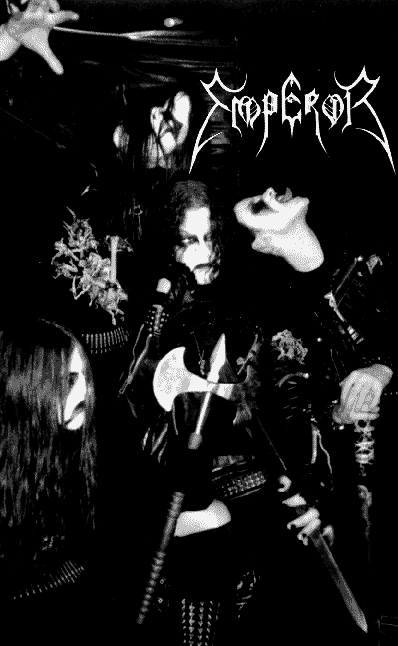
The most technically and musically gifted band of the Norwegian black metal scene, the legendary Emperor are also the most well known outside of the documentary-level engagement that plagues most who know of Burzum and Mayhem. Formed in the small rural town of Telemark Norway as a side project to a soon-forgotten death metal band, the group overcame the imprisonment of 75% of it’s lineup to deliver the most grandiose album of early 90s black metal. Though Emperor’s career was far from perfect, it made a profound impact on the young genre and ultimately proved it’s limitless developmental possibility.
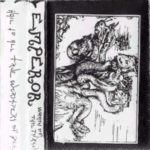 Wrath of the Tyrant
Wrath of the Tyrant
The Emperor story began when two guitar players, Ihsahn and Samoth, from the Norwegian death metal band Thout Shall Suffer decided to try their hand at black metal while the genre still was in it’s infancy. Intending to find a more traditional sound closer to Celtic Frost, the two found the bizarre bass player and lyricist Mortiis and formed the very first Emperor lineup. Limited to a 4-track tape recorder, the music of Wrath of the Tyrant offered the vocals, guitar, drums, and bass only only one track each. This therefore caused the relegation of Samoth to drums and the prevention of any keyboards from appearing outside the suburb intro rack. The resulting product ended up being a savage work of minimalist black metal draped in low-fidelity production and musically comprised of an almost exclusive use of atonal power chords and minor-key intervals. The songs are mostly short to mid length, contrasting which most of the black metal epics of their countrymen (as well as their own career) making many of the songs quite close to hardcore punk in sound and style. Sammath and Mortiis do their job as a drummer and bassists, with the later composing some interesting lyrics, but vocalist/guitarist Ihsahn truly shines with one of the most disgustingly vile vocal performances of all time. A violent vocal assault, masterfully over-reverbed to create a tone of sewage, takes Jeff Walker’s performance on Reek of Putrefaction to a next level in grotesque extremes. At just 30 minutes, this demo feels complete and satisfying and immediately put the underground on notice at just how enjoyable a raw black metal release could be.
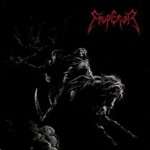 Emperor/Horades Land
Emperor/Horades Land
With the backing of a record label and the expanded budget that comes with it, Emperor now had a chance to be the band they intended to be. Introducing the skilled drummer Faust into their lineup allowed Samoth to assume the guitar role he was most suited for and the ability to record more tracks allowed Ihsahn to integrate the use of keybaords as an atmospheric element. Sharing a split with a very strong performance by their countrymen in Enslaved demonstrated Emperor’s true power as their side proved to unquestionably be the more formidable. With a short tracklist of the catchiest songs from Wrath of the Tyrant and In the Nightside Eclipse, Emperor for the first time takes a more nuanced and musically prestigious approach to black metal through the offering of counter melodies between guitars and a use of keyboard tones and compositions that mirror that of classical music. In comparison to the previous output the drums are improved, compositions are longer, and vocals are less dominant of the recording. The sound is both darker and more atmospheric and this ultimately serves a highly positive role in advancing such concepts creatively. Vocals are thinner and blend in better with the atmosphere and at times are de-tuned with a pitch shifter to create some truly haunting sounds. Guitars have a much more diverse array of riffs in new forms such as speed picked melodic lines and chaotic arrangements of triads and provide some innovative dynamics with each other. An integral step in the most beloved phase of Emperor’s career.
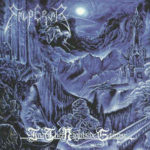 In the Nightside Eclipse
In the Nightside Eclipse
It is easy to make a case for In the Nightside Eclipse to be the best black metal album of all time and it’s rightfully remembered as one of the greatest albums of any metal genre. Nothing to ever come before (or after) was so majestic, so dark, so incredibly encompassing of the spirit of black metal. Recorded amidst the chaotic heights of the murder, arson, and death that surrounded the scene, In the Nightside Eclipse was cursed with it’s own misfortunes as one season saw 3/4ths of the band imprisoned for the aforementioned crimes. With early mixes leaking around the tape trading circles, the album was massively hyped by the time it was released and managed to exceed these high expectations. Built upon a foundation of clashing guitars- one maintained by a trance of long tremolo riffs and another providing melodies both melodic and opposing- the album is benefited from the most perfected use of keyboard melodies to cloak the album in mysteriousness and lore. Limited to only choir and strings, the synths of In the Nightside Eclipse create the most incredible nocturne of seductive emotions ranging from moods of sinister malcontent to a splendor of foreboding obscurity. No better soundtrack exists to the darkest aspects of the human experience than In the Nightside Eclipse, and without question it stands as the finest moment of Emperor’s storied legacy.
(Edtior’s note: the best review ever written of this album was penned by my predecessor. I encourage our readers to check it out here).
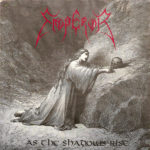 As the Shadows Rise
As the Shadows Rise
A less-known release of material recorded in the same session as the Emperor/Horades Land split, As the Shadows Rise is the last moment of the classic Emperor before the band ventured into more progressive waters. Coupled with Emperor/Horades Land, the pairing would make a pretty solid full length album but for some strange reason these tracks are seldom bundled together. Sound and composition is identical to the aforementioned split, with the same selection in keyboard tones and riffing techniques. The songs on here are reworkings of some of the other tracks from the Wrath of the Tyrant demo (the ones that weren’t recorded on the previous two releases) yet are clearly weaker than the other ones from this session. Still, the songs benefit from the addition of keyboards and dual guitars and are certainly worth a listen. Even in a short dose Emperor is effective, and perhaps it all worked out for the best to see In the Nightside Eclipse as the band’s true debut album.
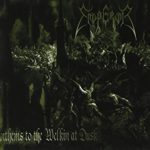 Anthems to Welkin at Dusk
Anthems to Welkin at Dusk
Emperor abandons the atmosphere and aesthetic of its preceding albums and replaces it with techniques of classic heavy metal and progressive metal. Exploring some fascinating compositional ideas in the vein of baroquean classical music, this album takes a bold leap in ambition and technicality but simultaneously sacrifices atmosphere and overall quality. While each song on In the Nightside Eclipse was outstanding and meaningful quite the opposite is true in this case- we have one of the worst (and unnecessarily longest) intros on any metal album, a throwaway outro, and two fillers. Ultimately you’re left with half an album as half of the album is useless material. The good half, however, is so undeniably strong that it left most of the metal scene (incorrectly) hailing this one as Emperor’s best. Full of challenging, thought provoking compositions, insanely innovative riffs, a MASSIVE improvement in lyrical content (abandoning the goofy satanic tropes of its predecessor), creative use of guitars, efficient demonstration of clean vocals, and a full orchestra’s worth of keyboard instruments, the four good songs on this album (Ye Entraceperium, The Loss and Curse of Reverence, Thus Spake the Nightspirit, and With Strength I burn) are some of metal’s greatest masterpieces whose legacy is well deserved. The addition of Trym, one of the greatest (and fastest) drummers of this age, is certainly welcomed and provides and outstanding backbone to the technical insanity happening in the guitars and keyboards.
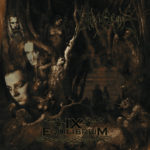 IX Equilibrium
IX Equilibrium
The issue of overall quality that plagued Anthems is magnified tenfold on IX Equilibrium as the ratio of good-to-bad material takes an even sharper dive on this one. Though injected with a greater dose of death metal, most of IX Equilibrium is mediocre flavor of the week death metal with impressive drums but lackluster everything else. It’s clear there was likely tension within the band over where to take the sound, with Samoth wanting to take a step back and Ihsahn wanting to progress the sound even further, and ultimately the compromise we’re left with is unsatisfactory and leaving much to be desired. IX Equilibrium may have resonated with the Nile and Hate Eternal flavor of the week death metal fans that polluted the world in the late 90s, but the release did not hold up as anything more than one or two songs that are entertaining in the live environment.
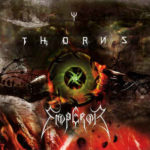 Thorns Vs. Emperor
Thorns Vs. Emperor
The most experimental moment in Emperor’s career comes in Thorns vs. Emperor. Paired up for the first release from the incredibly influential yet terribly ill-fortunes Thorns since Snorre completed his 6 year prison sentence, the two bands on this split work in collaboration rather than two separate sides. Recorded at the height of the music industry’s fortune, the two groups indulge in the popular European electronic music of that time with a limitless array of music production tools at their fingertips. For Emperor, this means strange trip-hop/breakbeat experimental electronic weirdness that falls flat on its face. While clearly one of the first real experiments in electronic for the genre (before we all realized it was a terrible idea), the strange cut/paste distortion of Emperor material just doesn’t blend with the electronics. Their cover of the Thorns epic “Ærie Descent” is however one of the best moments of their career and a true nod to a magnificent song that had not yet seen life past home-brewed demo tapes. Many bands have experimented in electronic weirdness on their full length albums, so let’s be grateful Emperor chose an “on the side” release to test these waters and move along.
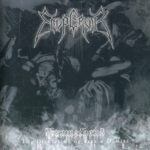 Prometheus: The Discipline of Fire and Demise
Prometheus: The Discipline of Fire and Demise
With a breakup looming on the horizon, Ihsahn’s bandmates granted his wish to compose one final work of artistic indulgence. Armed with a home studio and the creative freedom to write all of the riffs, Ihsahn threw every card on the table and left no stone upturned. Discarding nearly all of the band’s death/black metal influence, Prometheus was essentially a progressive metal album with seven string guitars and extreme metal vocals. If one can accept this and perceive it from outside of the Emperor cannon/narrative, one may be able to appreciate the creative genius of these compositions and enjoy a well-executed concept album of internal struggle and downfall. The most grandeur of all Emperor works, Prometheus is actually significantly lighter on the keyboards- using them mostly for atmosphere and in-between-song breaks- and features three separate guitar tracks that are often playing completely different melodies. Full of contrasting elements, this album has darkness, light, dissonance, harmony, all very well organized and distributed and unrelenting in their technical awe. There are no moments that feel out of place, no risks too great, yet for many this just isn’t Emperor, and because of this album is often looked upon quite negatively. As a progressive metal album, Prometheus is one of the best in extreme metal- far better than Opeth and far far better than any of Ihsahn’s solo works. But as an Emperor album, it does not live up to the quality, memorability, or power of the band’s early career. Ahead of it’s time, but ultimately missing it’s audience, Prometheus is an unfortunate epitaph of a band who gave us some of the most outstanding works of black metal. Fortunately, they didn’t needlessly hang around too much longer than they should have, and thus they remain enshrined as one of the greatest metal bands ever. Long live the Emperor!
Tags: Anthems to Welkin at Dusk, band catalog, Black Metal, discography, emperor, ihsahn, in the nightside eclipse, IX Equilibrium, progressive metal, Prometheus: The Discipline of Fire and Demise, samoth, Thorns


Is it just the or did Ihsahn look like Nancy Kerrigan?
Tonya would have crushed Kristi and Nancy, but she Varg’d out.
When Ihsahn was tranny, he made good music. Now that he’s not tranny, he makes lame shemale music.
Thanks for the link to the other review with the gayest ever comment section on the internet
If I thought that someone had proofread this article I’d say they did a terrible job. I have to assume the author got caught shoplifting in Saudi Arabia.
The production on ITNE sounds like Emperor were channeling some kind of cosmic power. It’s awesome. Might just be the reverb, though.
A lot of ATTWAD is just tensionless riffs interplaying with filler riffs.
Gay fucking band
Quoting from the AllMusic review
Putting this into less grandiloquent terms, it retained a streamlined version of the “dark and mystique” settings and some surface elements of the music, but added a lot of stuff which was just more platable for friends of more mainstream music, thus combining a selling formula – Gothic mysteries – with some “new and exciting colorations” (eg, “furious blast beats”) on an entirely conventional background painting. This is black metal for people who not only don’t like black metal but outright despise it as “inconsequential noise” without “complex, emotional content”. And that’s exactly how it sounds: I am the Black Wizards is so full cheesy mainstreamisms that it alone is sufficient to justify staying away from anything else Emperor ever recorded from this time on.
I take the inconsequential noise, thank you very much.
For all the talk on here a while back about how Gorgoroth ‘got lucky’ and recorded some near-perfect black metal albums before regressing to the mean, I can’t help but wonder if Emperor is really the lucky band of the black metal scene; one flawed but really good album (ITNE) and then three indulgent, cheesy clusterfucks. Gorgoroth at least put out two spectacular albums and then two flawed but good albums before Infernus allowed King to take the reins as the band slid into utter bullshit. When Infernus returned to songwriting after that faggity lawsuit, at least he showed on (insert laughably long latin album title here) he could still at least write pretty, if mostly meaningless, riffs a la Dissection. Gorgoroth maintained a level of quality for years while guys in Emperor were taking turns shitting on each others chests.
That website also called early At The Gates a typical Entombed clone.
What is good for you is not good for me!!
black metal is black metal, there is no good there is no bad, only suckers criticizing!